Two weeks ago, I attended the Northwest Tea Festival.
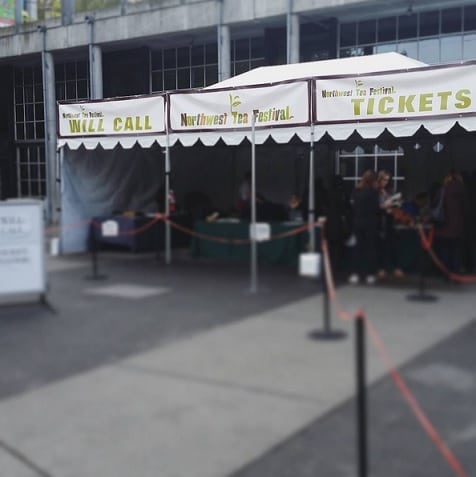
For both days, even!
It was an epic time of tea drunkenness and cuppa camaraderie. But when the time came to actually write about the two-day tea-stravaganza . . . I had nothing to say. Sure, I drank a lot of tea, met new people, reunited with old friends and contacts, but there was no story there. I drank, I saw, and then I trained home. That was pretty much it. If you want full(er) accounts on the tea fest, I suggest visiting The Oolong Owl and Delights of the Heart. Their coverage was pretty comprehensive, and I probably couldn’t have said it better. (Or more concisely.)
The festive weekend, however, did serve one weird purpose. It was a springboard for a few stories that I need to tell. This is one of them:
The first day of the tea fest, I stopped by the Young Mountain Tea booth a couple of times. One, to talk to the owner, Raj Vable, again—since I hadn’t seen him in (what felt like) years; two, I wanted to meet his guest of honor. Rajah Banerjee, owner and manager of the Makaibari tea estate in Darjeeling.
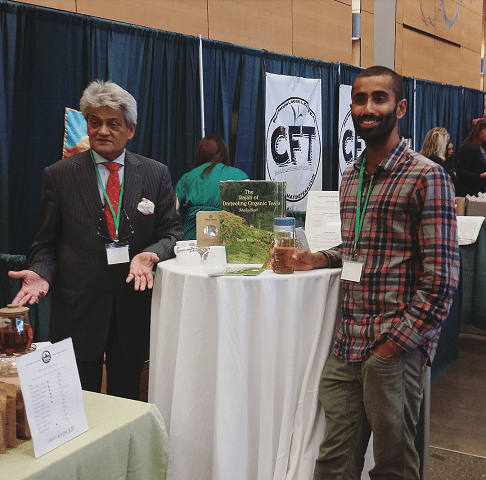
On my second pass of their booth, I went up and asked, “Are you the manager of Makaibari?”
To which he replied, “Negative! I’m the dog’s belly.”
I looked over at Raj Vable, confusedly.
He quietly nodded and said, “Yes, he’s the manager. He’s just messing with you.”
After that odd exchange, I tried to ask him a few other questions. Responses were equally as cryptic. He was mysterious, hilarious, and puzzling. And he sort of reminded me of my dad. That is, if my dad was an Indian, and a fourth-generation tea estate owner. The dry sense of humor was uncanny.
While I was there, still trying to keep up with the conversation, I went in for the Makaibari first flush they had available for sampling. He immediately yelled, “Stop!” before I put cup to lips. I did as he commanded.
“Close your eyes,” he said.
Again, I did so.
“Now sip,” he ordered again.
Did that, too.
“Now, make a wish.”
I made a wish. (No, I’m not tellin’.) First flush imbibed, I opened my eyes.
He bore down on me with a mischievous grin. “In twenty-one days, your wish will come true.”
Shortly after that, I left the booth. What the heck sort of bullshit was that? I asked myself.
In my li’l-over-a-decade tenure as a tea drinker, I’d met quite a few tea estate managers and owners. A few from India, even. This guy was something else entirely.
Over the course of the fest—as I darted back-‘n-forth between the festival floor and the tea-tasting building—I occasionally ducked into the Perennial Tea Room stage area. Just to see what speakers they had. Two of those three times, it was Rajah Banerjee at the podium.
The first time, it was a presentation on biodynamic/organic agricultural practices. James Norwood Pratt himself served as moderator.
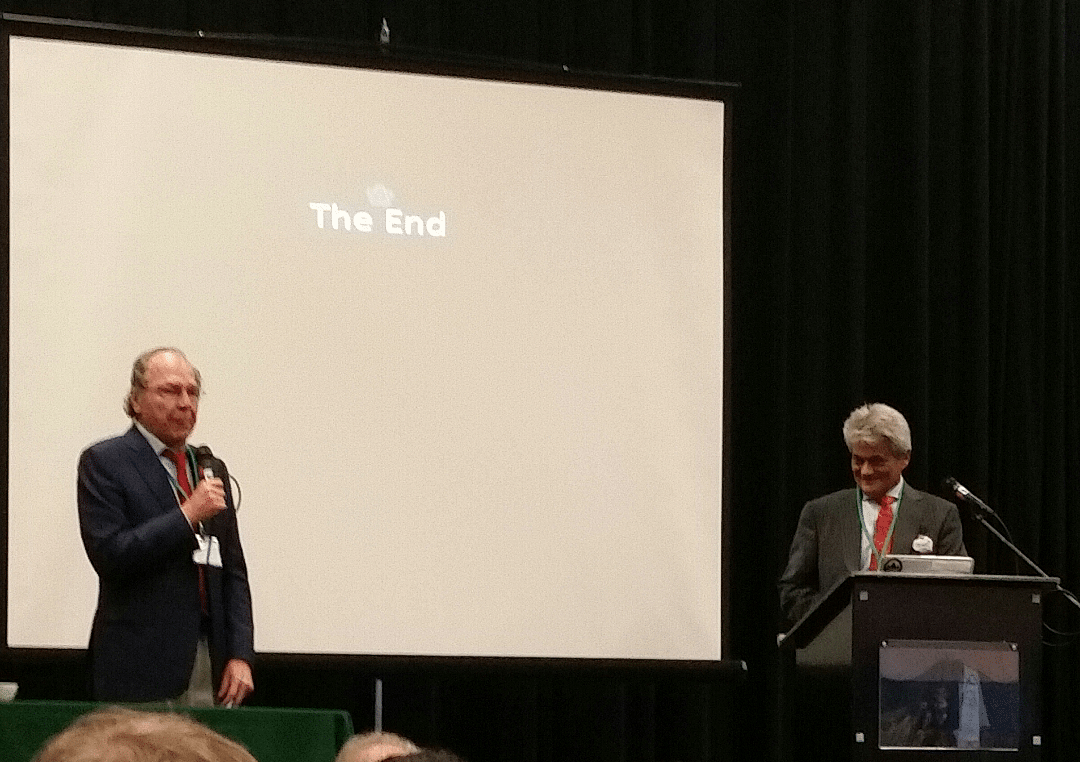
The third time I peeked in, he was on a panel with Pratt and Nigel Melican. I can’t—for the life of me—remember what the subject matter was; sustainable agricultural practices, I think? Rajah went off on some of the more . . . “cosmic” aspects of tea agriculture, whereas Nigel took the side of the technical. Norwood Pratt did his darnedest to keep the two on the same plane of existence. If ever there was a tea television show, it would have to be exactly this!
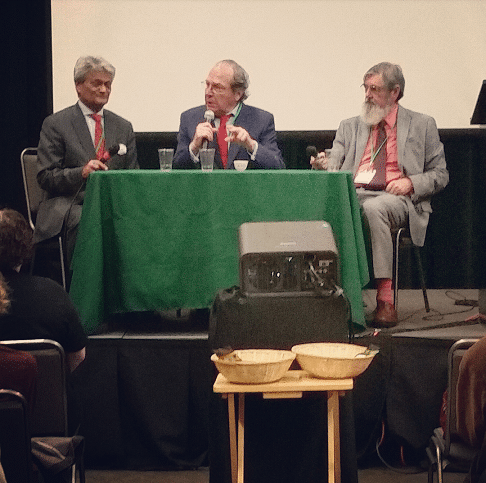
Once again, I left rather intrigued . . . and still confused. Either this guy knew some things the rest of us didn’t, or he was the best bullshitter in the tea biz. Or, quite possibly, both.
Roughly two days later, my phone chimed with a Facebook update. It was reminding me of an event I was interested in. Right then, I remembered why Rajah Banerjee had even appeared on my radar in the first place. Young Mountain Tea (as well as a few other organizations) were hosting a talk given by Rajah in Eugene. I originally dismissed it because (a) I was working that day, and (b) Eugene was really far away.
By some freak of scheduling, though, I was able to leave work early. I made a phone call to Young Mountain Tea, wondering if there were still tickets available for the talk. Raj Vable confirmed that there were. I bought one, and hours later, I made the two-hour trek to Eugene.
Eugene is an . . . odd town. It’s where hippie college students went to graduate, and where aged hippies went to die. Downtown Eugene looked a lot like Portland, only much, much more compact. And the air was thick with New Age-iness. For a split second, I even thought of moving to Eugene—since it was the last bastion of affordability in the state of Oregon. Not so much anymore.
I arrived at the events space about twenty minutes early.
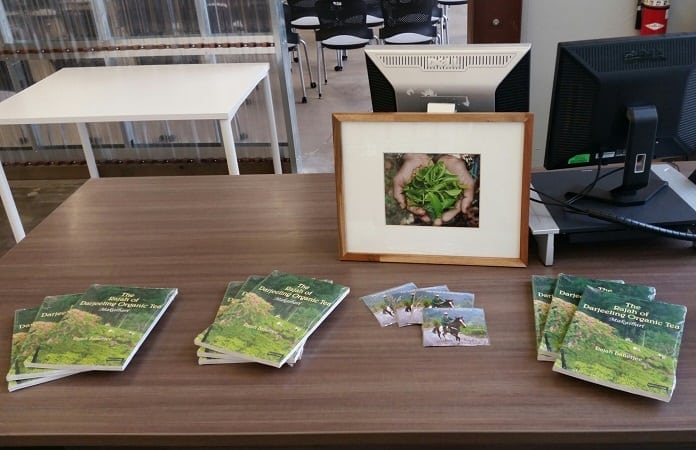
Young Mountain Tea reps were busy setting up. Raj Vable greeted me briefly before darting off in three different directions. I did my best to act like I belonged there. (Hard to do when you’re still wearing your work uniform . . . which in my case was a black smock.)
Rajah Banerjee, in his milling about, gave me greetings—vaguely remembering our encounter at Northwest Tea Fest. He asked where I came in from. I said, “I came down from Portland.”
“Aaah yes, Portland,” he mused. Then trailed off.
So confusing! I thought.
I went into the seminar room to pick out a seat. As I entered, I was immediately drawn to a sign on the wall.
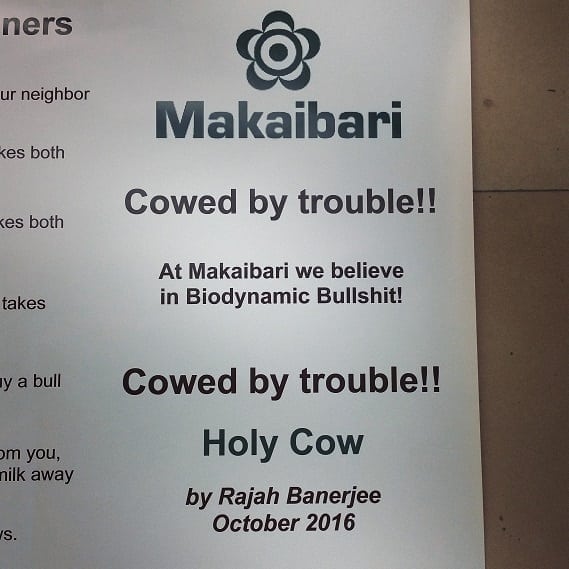
Wow, so he really did deal in bullshit. Like, literally! This promised to be an interesting talk, to say the least.
As all attendees took their seats, Raj Vable stood up and gave acknowledgements to the various subsidiary groups who helped make the talk possible. Then he introduced Anupa Mueller, Rajah Banerjee’s sister-in-law, and the Makaibari estate’s U.S. representative. She went into a litany about Rajah’s background and the background of the estate. Shortly after, Rajah took the “stage”.
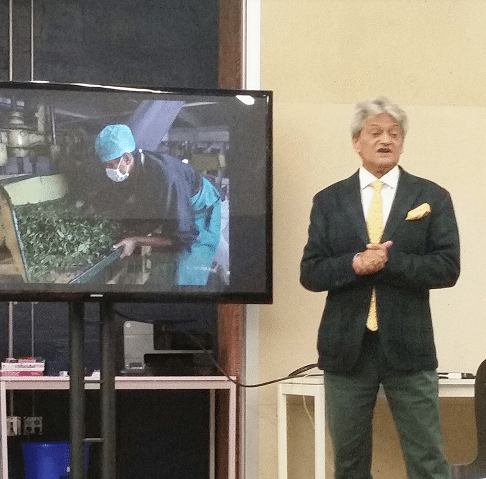
He essentially gave the same talk he did at the Northwest Tea Festival, but I only caught pieces of it, then. So, hearing it all from the beginning was a real treat. The man knew how to command the crowd, and he was very knowledgeable on the subject of tea agriculture and organic practices.
Much of his talk was on subjects I knew nothing about. For instance, I never knew that the word “Darjeeling” was from the old Tibetan phrase, “Dorjey Ling”, which meant “Land of the Thunderbolt”. Nor had I known that Makaibari was one of the first Darjeeling tea estates, ever, as well as the first to be certified organic. Most impressive, though, was the fact that he was the fourth-generation owner/operator of the estate. The garden having been founded by his great-grandfather in the 1850s.
When he started talking about biodynamic farming and literal bullshit, though . . . my eyes glazed over.
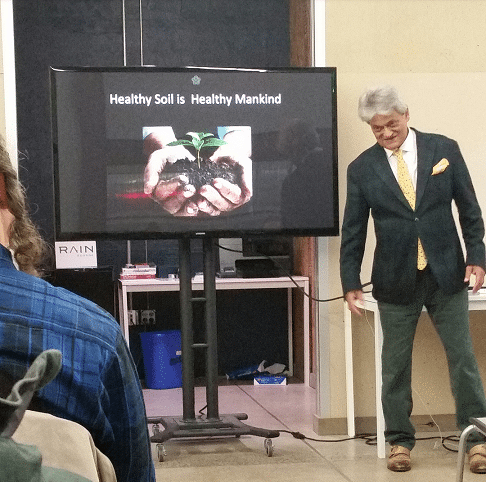
I tried my best to take notes, I really did. But even those didn’t make much sense. Among the subjects raised were cosmic cow horn energy, homeopathic ferment cultures, and viewing tea gardens as living organisms. Aside from the practical uses for cow dung (as fertilizer), I understood—maybe—half of it. Of course, Eugenites in the audience, being hippies at heart . . . ate. This. Bullshit. Up.
For me, it was like looking at the sun with my Third Eye. I knew it hurt, and my skepticism was in full-on rejection mode, but I couldn’t turn away. At the end of the talk, I couldn’t help but applaud.
Afterwards, the audience members retired to two different tasting stations, where various Makaibari wares were being served.

I drank my fair share.
As the crowd dissipated, I took advantage of the lull and approached Rajah Banerjee one last time.
He, again, brought up the fact that I was from Portland, and said, “I had a good friend from Portland. Do you know of Steven Smith?”
“Yes!” I said. “I knew him. As I recall, he and his wife were married at the Makaibari estate.”
He nodded. “They also spread his ashes there. He was a wonderful man.”
That tugged at my heartstrings a little.
I lingered for a little while longer, stuffing my face with more tea and generous amounts of free samosas. Then I said my farewells to everyone. Following all that, I was back on the road.
While I can’t say I’m a big believer in biodynamic agriculture, or an acolyte of the Sacred Cow Horn (or whatever), what I couldn’t deny was Rajah Banerjee’s passion. It was infectious. I even bought his book. His drive and determination reminded me why we all stuck with tea as a pursuit. There was so much to get out of it. From farm, to vendor, to cup, to . . . cosmic bullshit (if that was your thing). It was a never-ending partnership. Not an ownership.
I’m still holding him to that twenty-one-day wish thing, though.
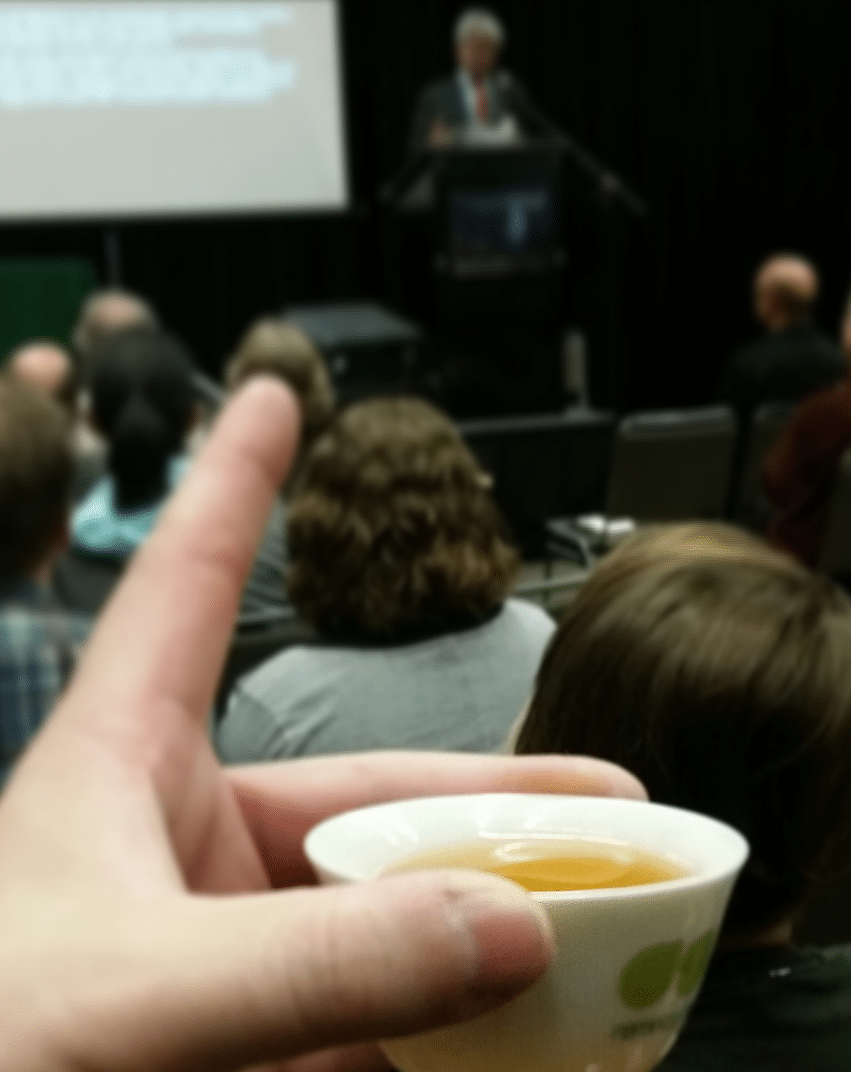
Leave a Reply